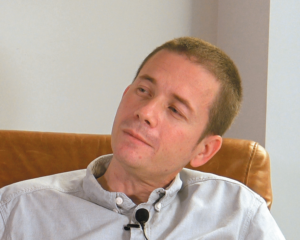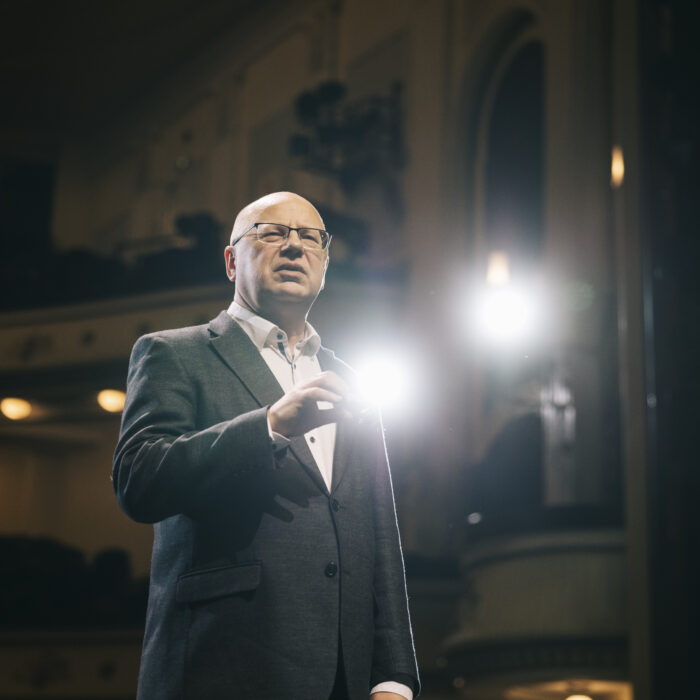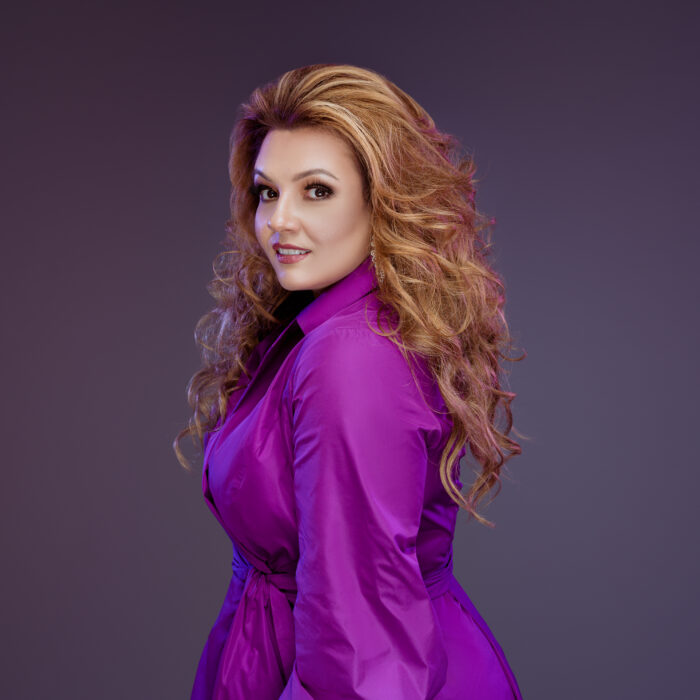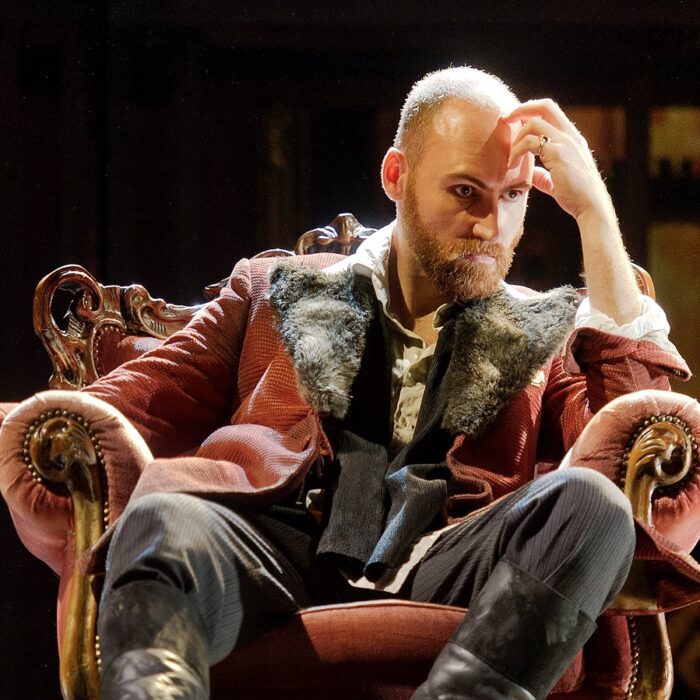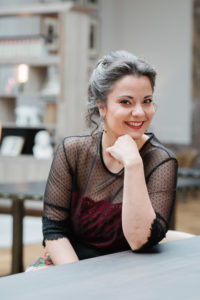
Q & A: Soprano Camila Ribero-Souza on Her Love for Wagner & Learning About Opera in Brazil
By Dejan Vukosavljevic(Credit: Candy Welz)
Soprano Camila Ribero-Souza was born in São Paulo, Brazil, where she studied singing with Jocelyne Gallo, Edilson Costa, and Luiz Tenaglia. From March 2011 until January 2018, she was a member of the soloist ensemble of the Meininger Staatstheater. In February 2018, as a spinto soprano, she joined the ensemble at the Deutsches Nationaltheater Weimar, where she is currently engaged.
Ribero-Souza has appeared in a wide variety of roles, including Irene in Wagner’s rarely performed opera “Rienzi,” which was her international debut. From there, she went on to perform in a number of operas such as “Le Nozze di Figaro,” another of Wagner’s rare operatic jewels, “Das Liebesverbot,” “Un Ballo in Maschera,” “Tosca,” and “Don Giovanni,” among others.
OperaWire recently spoke with Ribero-Souza before her big debut in the title role of Strauss’ “Ariadne auf Naxos” at the Deutsches National Theater Weimar.
OperaWire: You were born in Brazil. How did you develop your love for classical music in a country that is mostly known for exotic Latin-American dances?
Camila Ribero-Souza: Well, I come from a family filled with amateur musicians. Nobody at the time had done music professionally, but most of them played some instrument, or sang. In Brazil, even though we do Latin-American dances, we are a very musical people. My father can play almost everything by ear, almost every instrument – place it in his hands and he will play it. And my mother played the piano, so when I was three years old, she engaged me in a ballet school.
According to her, I came back from the first lesson and told her how beautiful the music was. After that, she waited for me to be a bit older, so when I was six years old, I started taking piano lessons. I actually wanted to learn the violin, but where I lived, the principal of the music conservatoire said that I was too young to learn the violin, at the age of six, so she recommended that we wait a bit longer. Essentially, to continue playing the piano and afterwards switch to the violin. And you know, that is really not true – but in Brazil, where people didn’t know much about classical music, that was the suggestion at the time. And in the end, I have never changed instruments. I stayed with the piano.
When I was 14-years-old, my mother asked me to make a copy of a piece of music from the CD to a cassette, so she could listen to it in the car. And she wanted to listen to the “Phantom of the Opera.” That is not really an opera, but you need to have a bit of a training in that direction to be able to sing it. The recording was with Sarah Brightman, and I was really fascinated with it. I thought that was real opera and it was so beautiful, I said to myself that I wanted to sing like that. I then looked through my mother´s CD collection and found the CD of “La Traviata” – and that was the moment. I was hooked.
My parents were not able to find a voice teacher where we lived. It took us two years to finally find one, so I actually started to learn how to sing at the age of sixteen. Then a whole new world opened up to me – Montserrat Caballé, Plácido Domingo – the Three Tenors were very popular at the time. I remember watching their live concerts on TV with Zubin Mehta and crying, wanting to do that, too. And that is how I was introduced to the world of opera.
OW: Did you engage in any operatic performances in Brazil?
CRS: Yes, I did. I had my stage debut when I was twenty years old, in “La Serva Padrona” by Pergolesi. I did the role of Serpina. After that, I sang Bastienne in “Bastien und Bastienne,” and I participated in the national Brazilian premiere of Haydn’s “Il Mondo della Luna” where I sang the role of Flaminia. That means I started as a soubrette coloratura. I also sang Blonde in “Die Entführung aus dem Serail.”
By then, though, I stopped singing as a soloist, as I had to make a living. It is not easy in Brazil to make the ends meet just by singing opera. So, I started singing in a professional choir half-time and retrained as a simultaneous interpreter and literary translator.
OW: How did you know that you would like to become a professional opera singer?
CRS: I think that moment happened when I found out that I could have a professional college degree in music. Because until that point, I had been preparing to be an architect. I was actually not aware that I could do music professionally. And I vividly remember that moment – I was reading a magazine and saw an ad with the title “Opera singing Degree.” From that moment onward, nobody could hold me back. I thought – well, if it is written here, then it is an official profession. At that moment, I knew I would become a professional opera singer.
OW: You have decided to leave your home country and go to Europe to start an operatic career. How difficult was it for you to make such a decision?
CRS: At the time it happened, it seemed like the logical thing to do. I had already had the opportunity earlier to study at the University of Indiana with the famous Romanian-born soprano Virginia Zeani. She had offered me to come to Indiana so she could teach me herself. At the time, I had refused the offer because I was still married and I was trying to build a family.
A couple of years later, the famous tenor Ian Storey heard me singing in a master class. He was doing “Tristan und Isolde” at La Scala with Daniel Barenboim, and told me that he believed I had the voice for an international career and offered to help get me to Europe to further my studies. I accepted. He wrote me recommendation letters that ended up leading to a scholarship at the Royal Northern College of Music in Manchester, England, in the Master Degree in Performance program, and I moved to Manchester.
And I had to do it that way, because freelancing in Europe from scratch is not really doable for South Americans (at least was not at the time) due to visa issues. The University was my way into the European opera world. I graduated in Manchester “with distinction” and already in possession of a contract for a fest position as a soloist at a German opera house.
OW: What was your first choice in Germany? What opera house did you choose to start with?
CRS: Well, the opera house chose me. I was attending the (now extinct) Opera Studio in Amsterdam in conjunction with my last year at the college in Manchester. And I was auditioning in many places. The Meininger Staatstheater then invited me to join the ensemble. I was supposed to give my debut there as Contessa Almaviva in “Le Nozze di Figaro,” but it turned out that they needed something far more urgent: the role of Irene in Wagner’s opera “Rienzi.” They asked me to come in earlier than originally planned in order to learn and perform the role of Irene. “Rienzi” is a very rarely performed opera, so that was a sweet opportunity for me.
OW: After “Rienzi,” you performed in another operatic rarity – Wagner’s second opera “Das Liebesverbot,” where you sang the role of Mariana. What did you discover in this very early Wagner work?
CRS: “Das Liebesverbot” really solidified my love for the big German repertoire. In those early pieces, Wagner was still very Italian in his music writing, in understanding of it. But he already had the seeds of the orchestration style he then developed in his later works. And there I found the fantastic combination of Italian singing and the German heart. I just felt it was a brilliantly intriguing combination, and I wanted to do more of that. For example, you could easily recognize the influence and subtle musical signatures of Donizetti and Verdi in “Rienzi.” It is fantastic.
And that was also the case with “Das Liebesverbot.” Isabella is a real Verdian heroine. Mariana is a small role, but crucial for the opera: without her, there is no story. She needs a stunning lyric sound. You have to keep the voice going on the fiato the whole time. She has only one duet at the beginning with Isabella, and in the end she engages in one aria. But if that aria is well sung, she goes away with the show. She literally steals the show.
OW: During your career, your dramatic roles have been overlapping with more lyric roles. How do you manage to shift between two major approaches? Does your voice need special adjustments in those cases?
CRS: Yes, the voice does need a few adjustments when switching between more lyric and more dramatic roles so it doesn’t come off the body in the more lyric repertoire. I would like to make clear that the progression from the lighter lyric repertoire into a dramatic repertoire is a very natural process of maturing and expanding the voice and the repertoire. It happens to most people. Only a few singers stay the same and do not undergo that process, because each body is different and matures differently.
In the old days, everybody would wait until they were almost 40 until they approached the more dramatic repertoire, in all types of voices. When you are younger, you don’t have the vocal development, the maturity, the serenity in the body, in the mind and in the voice to tackle the difficulties of a more dramatic repertoire. You also need life experience to deal with it.
And if you do it in a clever way, you can actually always go back to the more lyric roles. The only issue here is – when you start singing the big dramatic roles, you are not invited anymore to sing more lyric stuff. Also, the more lyric roles are usually younger characters, and if you have already reached certain age and the maturity for bigger roles, you’re not considered adequate for more lyric roles. But that is not actually true.
For example, Giorgetta in “Il Tabarro” is a 25-year-old young woman, but she is cast with spinto sopranos due to how Puccini wrote the score. In other cases, it depends on how you look at it. In my opinion, all roles, including Isolde and Brünnhilde, should be approached from a lyric vocal point of view. Even big dramatic voices have to think lyrically. “Lyric” should not be seen as a vocal classification, but a way of singing, doesn´t matter what voice type you have.
OW: You regularly appear in the title role of Puccini’s opera “Tosca” at the Deutsches Nationaltheater Weimar. How do you balance between emotions of deep sorrow, fragility and ultimately rage to portray Tosca credibly onstage?
CRS: Tosca is actually the role that is closest to me, to my personality, my heart and my soul. I don’t have to act her out, with Tosca I just have to be myself onstage. In order to go through every facet of Tosca – fragility, sorrow, despair and then rage – the solution I found for myself was to actually give in to it, not to fight it. It’s a normal human reaction, when you’re confronted with difficult situations and difficult feelings, to try to block them out, push them back. It is normal that you don’t want to suffer and feel the pain of all those emotions and feelings.
With Tosca, I do not sing the role. I literally live it. If I try to fight the emotions that Tosca brings up in me, my muscles would be all cramped up, including my throat. My personal solution is to completely relax, and let those emotions just come out in a fluid way, without doing me any harm in the process.
It is natural for a singer to fear that the expression of rage could wreck the voice, but I think that could only be the case if you resist the rage, if you try to control it. If there is tension, that may be damaging. But if you relax the body, the throat is also immediately relaxed. And I try to use that approach in all the roles where I have to suffer too much. And it works amazingly well for me. Also, it requires an enormous amount of body awareness and trust in your body and in your own technique. I am able to cry and to sing at the same time without closing up my throat.
Also, on stage I am not Camila: I am Tosca. If somebody were to ask me my name at that moment, my reply would be Tosca. I have no idea who Camila is.
OW: You have also become known for portraying the roles of Elisabeth and Venus in Wagner’s romantic opera “Tannhäuser.” Where does Elisabeth experience her love for Tannhäuser?
CRS: I have thought about this for a long time, I have to say. As we know, love is a chemical reaction in the brain. But where they experience their spiritual love – it might be a new spiritual dimension, but it needs context. If you think of Elisabeth, who she really was in real life – she was not a virgin, she was actually married to the Landgraf and had three children. That is very easy to verify, just go to the Wartburg castle and look at the files – and you will find there literally everything about her life. Or just google it.
But in the opera, Elisabeth is a virgin and the niece of the Landgraf. She has never had any physical contact with a man. If you compare the real Elisabeth and the Elisabeth from Wagner’s poem, you will see a huge difference. A Virgin, in the religious Christian belief that Wagner set his opera, is a significantly more pure and sacred being than a married woman with children.
Also, I am not sure if Elisabeth loved Tannhäuser in the same way that we now comprehend love in the 21st century. Tannhäuser indeed provoked many emotions in Elisabeth, but I believe the prevailing one was the feeling of confusion. She feels confused due to the plethora of new different feelings Tannhäuser awakens in her with his music. But to qualify that as love, I am not sure if that works. Maybe I´m thinking too much in 21st century terms… She was, of course, faithful to him and very protective of him. As a devoted Christian, she certainly felt that was the right thing to do. But of course, with every new production of this opera, the story is put in new contexts, given new light and the characters are given new motivations.
The moment when she saves Tannhäuser‘s life – that is very reminiscent of the scene with Jesus and Mary Magdalene. Of course, she did not believe he was a saint, or anyone in that sense – quite the contrary, he had just admitted that he came from the Venusberg, where he indulged in a sinful life. But her message to the other singers was: “Who among you is going to throw the first stone?”
Also, there is one very important aspect in Wagner´s story – Tannhäuser was a medieval Troubadour. And medieval troubadours would sing about love, mainly spiritual love in elevated Christian morally accepted ways, but they would never touch the woman they sang. It is a platonic love rather than a carnal love. He discovered carnal love when he went to Venusberg.
If we look at Tannhäuser in the medieval context Wagner originally wrote, his songs were idealized praises, very poetic but bubbling with unknown instinctive longings that he later experiences in the Venusberg. That´s what differentiated him from the other singers. Even though there is no concrete evidence that Tannhäuser really existed, like there is with Wolfram von Eschenbach and Walther von der Vogelweide, the Sängerkriege did take place in the Wartburg – if you go to the Wartburg castle, in Thuringia, Germany, the original stage of the competitions is still there and open for visitation! And I have had the privilege to sing the roles of both Elisabeth and Venus at the Wartburg castle Feast Hall. Thus, I was able to feel that magic! It is a unique experience!
OW: Eva in “Die Meistersinger von Nürnberg” is a bride without a bridegroom. The opera begins like a comedy, but several more aspects arise. How did you approach the role of Eva?
CRS: I approached the role of Eva very carefully, to be honest. Vocally specifically, because it ranges wildly. The Second Act is very low on the voice, almost written for a mezzo-soprano. And in the Third Act, it is placed rather high, in a very Straussian way, with huge lines and a big sustained breath.
So yes, I did it very carefully in order not to push the voice, especially in the duets with Sachs, because that can be very dangerous. Secondly, I tried to get the character of Eva out through the articulation of the text. The colors of the vowels in German and inflections of the text are not the same as in Italian or French. That was one of the roles that I worked very intensely on the text, in order to bring out the expressions necessary for the role.
And of course, Eva is a delightful young girl. She is very defiant and, at the same time, very sweet. Then she shows maturity, but with Sachs she can be very childish. This opera has such a wonderful amount of colors, especially in the character of Eva, it´s a joy to sing.
OW: In October 2014, you were nominated for Singer of the Year by the Opernwelt, for your performance as the Marschallin in Richard Strauss’ “Der Rosenkavalier.” What was your dramatic ingredient for the role?
CRS: I was actually relatively young when I sang the Marschallin for the first time. Singers usually tackle her at an older age, but to me it was a wonderful opportunity to challenge myself and grow as a singer. So in the First Act, I approached the Marschallin as a younger woman. Per the score, the Marschallin is 35 years old – a 35-year-old woman back in the 18th century was very different than in the 21st century, if she actually lived that long and didn´t die in childbirth long before that. So, I allowed my Marschallin to be young and more innocent again, especially in the relationship with Octavian. In the safety of her bedroom, I stripped away not just the clothes, but also the weight of the responsibilities she has as a Marschallin. In my relationship with Octavian, it looked like we were about the same age. I tried to portray her as if she were 18 years old again: sweet, innocent and full of joy.
Of course, Baron Ochs comes and reality sets in. So, I slowly advanced her back into her responsibilities towards the end of the First Act. And finally in the Third Act, she comes back in all of her full Feldmarschallin-glory.
OW: Amelia in “Un Ballo in Maschera” is a woman both deeply in love and in torment. What was your approach to portray Amelia believably onstage?
CRS: I have already performed the role of Amelia in “Un Ballo in Maschera” in about five productions. It is one of the most interesting Verdian roles in my opinion, because she is not a silly innocent virgin. She is a married woman who loves her husband, who loves her child. And she is infatuated with the count/king (depending on the version). She is not really sure if she loves him or if it is more of a crush. But she is very aware of her responsibilities. And her responsibility, her duty towards her family is the most important thing in her life. With the count/king… If that is only an infatuation, it might grow into a mature relationship which could end up in a family. But she already has a family. And there lies her torment.
Riccardo (or Gustavo) is probably a bit younger than her, unimpeded, very much passionate and impulsive. She cannot allow herself to be impulsive and remains faithful to that family. Whether she is really in love with him or not, that is a question I am still asking myself. But whatever it might be, it is powerful enough to make her almost lose her mind.
And in my approach, I have always tried to bring out the dignity of her character, coupled with her torment and despair. And that has to be done within the course of two-and-a-half hours
OW: In less than a month, you will make your debut in the title role of Strauss’ “Ariadne auf Naxos.” How do you prepare for the role of Ariadne, and especially for the relationship with Zerbinetta?
CRS: I found it fascinating from the beginning, because it is the opportunity to play two characters in one piece. I have the Primadonna with all her quirks, screaming around because nobody does what she wants. And then in the second part, I get to portray her artistry, and to deliver a very believable Ariadne, a Greek personality. And these two parallels are already very interesting for me.
But the relationship between Ariadne and Zerbinetta is fascinating, because both women experience loneliness. They just deal with it in different ways. Ariadne wants to die, she is desperate, it is probably her first life crisis. On the other hand, Zerbinetta has had the same experience many times before and knows that life goes on even after these traumatic experiences. As she tells in her aria: “This is not enough to curse all men, to stop loving. We have all been through this.”
They could be the best of friends. And I’m trying to show this in my interpretation.
OW: How do you deal with big challenges of professional operatic singing? Where do you find your daily sanctuaries?
CRS: I try to deal with the things with a clear head, and both feet on the ground. To have a warm heart, full of love. I also try to be very self-aware and know up to which point I can go. I relax listening to Jazz, I also have my furry friend – my dog Millie, who is my huge stress relief. I like to go camping with her. I also like meeting my friends – and even doing big puzzles.
After really big performances, I come home, have a glass of wine and play Ella Fitzgerald. After a long week of rehearsals, I like to listen to a lot of Bach.
OW: Do you have any advice for young, aspiring opera singers who are just starting their operatic voyages?
I would say that vocal technique is important, but young singers should know they are not on the stage to serve the technique. The technique is there to serve them, to free them, not to put them in a prison.
I would tell them further to go out and meet people. To have experiences. And the most important, to enjoy life and their artistry.
